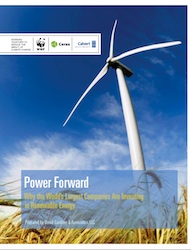As climate talks begin to wind down in Qatar, a new report, “Power Forward: Why the World’s Largest Companies are Investing in Renewable Energy,” has been released by Calvert Investments, Ceres and World Wildlife Fund. The report concludes that many of the world’s largest companies are not waiting for binding treaties and subsequent polices, rather they are integrating clean energy and lower emissions into their business now.
The report shows that many Fortune 100 companies have set renewable energy commitments, greenhouse gas (GHG) emissions reduction goals, or both. While the movement is strong in the U.S., the trend to sustainability is  even stronger internationally.
even stronger internationally.
“The companies that are boldly setting either greenhouse gas or renewable energy goals and making progress on those commitments are demonstrating the business case and real leadership on climate change,” said Marty Spitzer, WWF’s Director of US Climate Policy. “And, in the process, these companies are changing the game — driving significant renewable energy investment globally and pressing for the right policy and market conditions that will allow companies to do even more.”
The report finds that clean energy practices are becoming standard procedures for some of the largest and most profitable companies in the world. For example, many companies are shifting from purchasing short-term, temporary Renewable Energy Credits (RECs) to longer-term investment strategies like Power Purchase Agreements (PPAs) and on-site projects, indicating a long-term commitment to renewable energy and reaping the benefits of reduced price volatility.
For some companies, there are still key barriers to achieving sustainability goals including: the fact that in some regions renewable energy is not yet at cost-parity with subsidized fossil-based energy; internal competition for capital; and inconsistent policies that send mixed signals to companies and investors in renewable energy projects, particularly instability in renewable energy incentives; and policies that prevent companies from signing green power purchase agreements.
The report also offers several recommendations for U.S. policymakers, including promoting tax credits or other incentives that level the cost playing field for renewable energy, specifically, extending the Production Tax Credit (PTC) for wind energythis year; establishing Renewable Portfolio Standards in states that do not have them; removing policy hurdles in states that prevent companies from contracting to buy the cheapest renewable power available and building on-site renewable power generation; and market-based solutions that put a price on the pollution from conventional energy generation.

